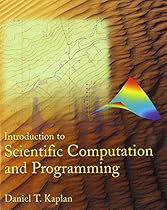Introduction to Scientific Computation and Programming

| Author | : | |
| Rating | : | 4.29 (894 Votes) |
| Asin | : | 0534389139 |
| Format Type | : | paperback |
| Number of Pages | : | 546 Pages |
| Publish Date | : | 2017-07-17 |
| Language | : | English |
DESCRIPTION:
Wonderful condition! Couldn't be happier! Shipping was quick and the book is in great condition! Thank you for the exceptional customer service.. Excellent book with practical usage A Customer The book is well-written, interesting and you can do a lot after reading it! It is for both beginners who don't have any idea of programming and even for people with experience, you will still find something here. Very suitable to be a textbook.. Alright for an introductory book Using this book for an introductory civil engineering course. The reading is somewhat difficult to understand but the exercises make the reading make a lot more sense.
Balancing the best of the teach-a-package and teach-a-language approaches, the book teaches general-purpose language skills and concepts, and also takes advantage of existing package-like software so that realistic computations can be performed.. This book provides students with the modern skills and concepts needed to be able to use the computer expressively in scientific work. The author takes an integrated approach by covering programming, important methods and techniques of scientific computation (graphics, the organization of data, data acquisition, numerical methods, etc.) and the organization of software
Perception and Generation of Sound. Color. 4. Accumulators. ASCII Characters. Outputs of Unknown Size. Shared Environments. Trees as Data Structures. Exercises. Logical Operators: Boolean Operators with Boolean Inputs. 12. Example: Optimal Matching (Recursive). Expressions and Commands. 15. Multiway Recursion. Computation as Reaction to Events. Finding Solutions. FILES AND SCRIPTS. For Loops. Computations on Vectors and Matrices. Exercises. Optional and Default Arguments. Exercises. Project: Sums of Gaussians and Segmentation of Images. Digital Sampling of Images. Combin
Daniel Kaplan is Associate Professor in the Department of Mathematics and Computer Science at Macalester College.
